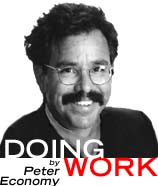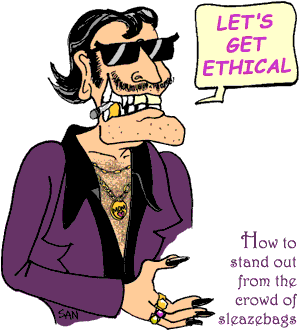 |
|
||||||||||||
|
Columns by Peter Economy
List all of Peter's columns
|
In case you haven't already noticed, ethics are a critical factor in the equation that is client relations. Good ethics can help you build strong, long-term relationships with your clients -- which are essential to your success as an IP. Bad ethics, on the other hand, will send your relationships to the bottom of the sea faster than a rogue iceberg floating in the North Atlantic. Unless you're a shark, this is the last place you want your nifty little business to end up. The temptation to stray from the good side of the ethical line to the bad can be strong. We've all faced situations where a little lie here or there could make a difference in the amount of money we bring in, or the client referrals we get, or the fame and glory we attract -- sometimes a big difference. With bills to pay, mouths to feed, and lifestyles to support, the idea of a few extra bucks in the old checking account can be a very compelling one indeed. Here's a common ethical predicament for many IPs: conflicts of interest. Conflicts of interest occur when your personal interests -- or those of your business -- conflict with those of your client. IP conflicts of interest come in many different flavors: management consultants who pass confidential information between common clients who are in competition with one another; architects who insist on the most expensive materials possible (and who mark up these materials by a standard percentage which, incidentally, means that they have no incentive for saving their clients money) when something less expensive would do just fine; financial consultants who churn investment accounts to generate large commissions, while slowly whittling away their clients' principal. The list of possibilities is virtually endless. Avoiding conflicts of interest isn't always as easy as you might think. If there's one thing I've learned over the years, it's that it really is a small world after all. I've lost count of how many times I've learned from a client that I know his friend, relative, business partner, colleague, competitor, or enemy. The point is that any information you pass from one client to another can lead to a conflict of interest, and this can destroy the relationships you've worked so hard to establish with your clients. Years ago, I learned that lesson the hard way. I was talking to a client -- let's call him Tom -- about a new project I had just started for another client. I should have stopped talking when Tom's ears perked; unfortunately, I didn't. Sure enough, Tom jumped on the idea and ran with it. When my new client heard about what had happened, I caught holy hell for my transgression. Looking back, I was probably lucky I didn't end up in court. As it was, I destroyed the trust we had established and, with it, our business relationship. Trust is the glue that holds relationships together. This is as true in our business lives as it is in our personal lives. When you violate accepted ethical standards and practices, you erode the trust that you have built with your clients. If you're unethical in once instance, what's to stop clients from asking other questions about your ethics? If you excessively pad your resume, why wouldn't you steal diskettes or toner cartridges from the supply room? Or deliver a crappy product and try to pass it off as a great one? Or even sell your clients' trade secrets to the highest bidder on eBay? If you want to be trusted, you need to be ethical. I know someone -- let's call her Susan -- who once referred a business acquaintance to a good client of hers. Extremely happy to get the referral, the business acquaintance agreed to pay a small amount of money to Susan as a finder's fee. After signing a contract with the client, he reneged on his promise -- not only destroying the relationship that he had built over the years with Susan, but ensuring that he never received another referral from her. According to Susan, it wasn't about the money -- it was the fact that she felt used and abused by someone she trusted. What about you? What will your client do if he or she finds out that you've made up expenses that don't exist, or that you really don't have the experience that you claim, or that you're fudging the results of your work? Do you really want to find out? The most important thing to remember about ethics is that we all make mistakes from time to time in our projects -- we are human, after all. Ethics isn't about mistakes, however, it's all about intent. It's one thing to send a client a duplicate invoice by mistake. But it's another thing altogether to consciously bill your client for expenses that you know full well had nothing to do with him or his project. The first situation is an honest mistake; the second is lousy ethics. One more thing. Ethics are not absolute; they vary depending on the prevailing culture and the dictates of the industry and the organizations that you work for. While some clients may be looking to you for ways to stay within the posted speed limit, others may want you to go as fast as you can without getting arrested. Your job is to be sure that your own ethical standards are at least as high, if not higher, than the clients you work for, and to avoid compromising your own values. Anything less, and you're driving your Zamboni on very thin ice. Try to become conscious of the ethical component in your own business life. What rules or values are you willing to bend or to break to advance your own cause? If you make it a point to recognize the times when your ethics get mushy, then you can do something about it. We all know the difference between right and wrong (you do know the difference, right?), and we all know when we have crossed the line that separates good ethics in our line of business from bad ethics. Cross the line once or twice -- with just your little toe -- and you'll likely cause little harm to your clients or to your business. Cross the line too often, or jump in with everything you've got, and you'll soon find your reputation tarnished -- or perhaps even destroyed -- and your business along with it. |
||||||||||||||||||
|
We'd love to hear your feedback about this column, or put you in touch with Peter Economy if you like. You may also like to see his biography. |
|||||||||||||||||||
The 1099 name and logo are trademarks of 1099 Magazine.

